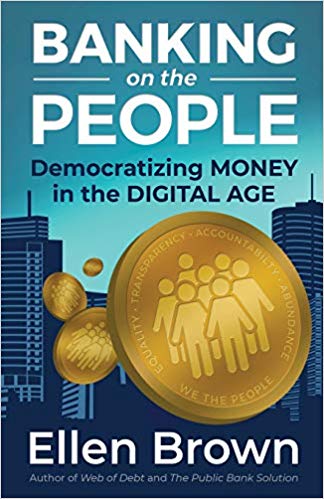Banking on the People: Democratizing Money in the Digital Age
A Book Review

A few weeks ago I posted a blog about Ellen Brown (its here if you want to read it) and then her new book came out; Banking on the People -Democratizing Money in the Digital Age. She introduces it with these thoughts; ‘We live in revolutionary times’, voters are voting ‘in favor of the wrecking ball’ …Brexit in the UK, Trump in the U.S. She says that those are symptoms of discontent with our economic system and that what is now needed is, ‘a new economic model, one designed to elicit the abundance of which the economy is capable.’
In my earlier blog I praised her easy to read style and her ability to explain complex ideas about money and banking so they make sense. That was then.
In this new book she goes into detail on more complex things; digital currencies, bitcoin and cryptocurrencies and the shadow banking system for example. There are more details about the repo market, blockchain and derivatives. Things we’ve heard about, but most of us don’t understand.
There is a lot of detail about what India, China, Russia and other countries are doing to embrace new types of money. Russia is pursuing the Cryptoruble. India has developed a digital payment system to include and help the millions of people who are outside the banking system. China is using digital payment systems; over 12 trillion dollars worth were paid using them in 2017 and done without the fees that western banks would charge. All Chinese people need is a digital phone, not a local bank.
One reason behind some of these activities is an increasing desire in much of the world to end the unfair advantage that the U.S. has had by having its currency serve as the global reserve currency. That is the reason that the United States can have debt so large it’s impossible to pay which (i.e. the country is bankrupt) but at the same time…. no one seems to notice.
Since 1944 and the meeting in Bretton Woods that made the US dollar the world reserve currency and following that the 1974 coup by Henry Kissinger to have the world accept that Saudi oil would be sold only in US dollars… the US has reaped the benefit. Their dollar has been propped up in value when their growing debts should have undermined it. Americans have benefited at the expense of the rest of the world.
But in the last decade or so, efforts by many countries to escape this system have intensified. A good part of Banking on the People is about how these efforts are creating interest in cybercurrency and possibly even a global currency.
Last month the governor of the Bank of England, Mark Carney (click here to read more) gave a speech in Jackson Hole Wyoming at a meeting of global bankers. He’s a Canadian and a Goldman Sax alumnus. He worked at Goldman Sacs for thirteen years before heading the Bank of Canada for five and then went to England in 2012 to head the Bank of England. In his speech he suggested it may be the time to end the era of using the US dollar as the global reserve currency and replace it, possibly with a new digital currency.
The very fact that he raised the subject reveals a major crack in the prevailing world financial system. Carney is an unlikely person to lead the charge to people focused banking, but the fact that he is willing to deviated from a U.S. dominated banking system is interesting.
His speech reinforces the legitimacy of Ellen Brown’s ideas; she is ahead of her time as she foresees changes that need to be made. She blogs regularly and you can subscribe on her blog site (just click here).
Her consistent message is that banks can and should serve the people and not the bankers. All we need is a publicly owned bank, as opposed to private ones. The old Postal banks used to do that. Our present system of letting the banks create and control money is one of the prime reasons why the rich get richer and richer and the rest of us poorer.
Her latest book isn’t easy reading…. but her ideas open our eyes to an economic system that could serve us the people rather than them, the banks.
*
Note to readers: please click the share buttons above or below. Forward this article to your email lists. Crosspost on your blog site, internet forums. etc.

